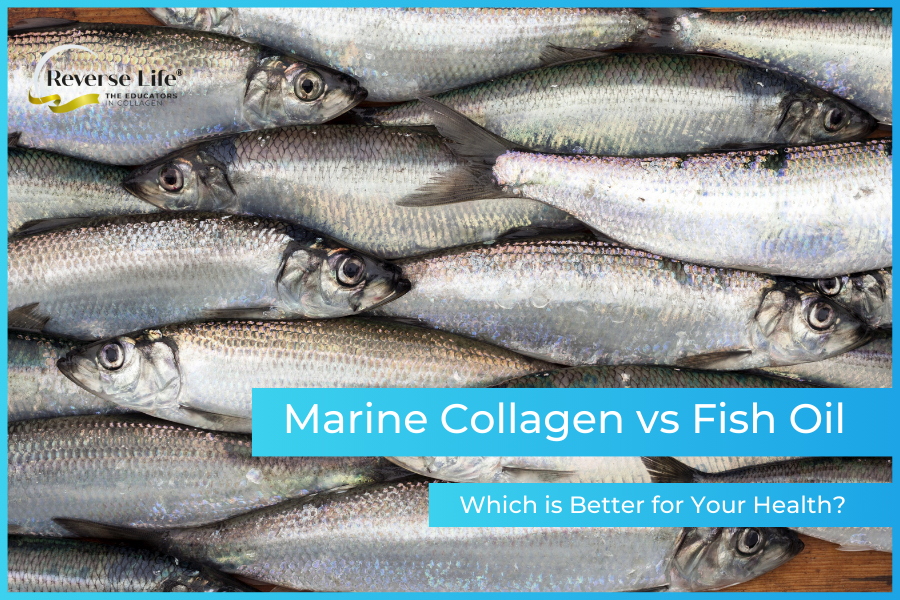We all know the importance of caring for our skin, hair, and overall health. And when it comes to choosing the right supplements, it can be overwhelming to decide which ones are worth it. Marine collagen and fish oil are two popular choices often pitted against each other. While they both have their unique benefits and are typically sourced from fish, let's dive deeper into the differences between them and which might be the right choice for you. We'll also consider whether it's worth combining the two for even greater health benefits.
Benefits Of Marine Collagen:

Marine collagen is sourced from fish skin, scales, or bones. It is a widely popular supplement. Collagen is essential for our skin and overall health. It helps strengthen our bones, muscles, and tissues, keeping our hair, skin and nails strong and healthy.
Collagen can improve skin health by enhancing moisture, elasticity, and hydration. It also promotes joint health, supports gut health, and contributes to a healthy metabolism.
Here are some of the key benefits of marine collagen:
- It contains Type 1 collagen, the most abundant form in our skin and helps maintain its structure and firmness.
- It has anti-inflammatory properties that can help to reduce joint pain and stiffness.
- It may boost your metabolism and aid in weight loss due to its high protein content.
- It may improve gut health by helping to repair the intestinal lining.
Why Is Marine Collagen Considered Better Than Bovine Collagen?
Marine collagen is derived entirely from sea-dwelling sources, such as fish scales, skin, and bones. It's been rising in popularity due to its unique structure and amino acid composition that benefit skin health. In particular, rescuing fish parts like skin, scales, and bones for marine collagen production promotes sustainability and reduces waste.
Additionally, marine collagen from alternative and sustainable sources has been considered because it does not harbour transmissible diseases like cows, pigs and sheep, the primary bovine collagen sources.
Benefits of Fish Oil

Fish oil is extracted from oily fish such as salmon, mackerel, and sardines. It is a popular supplement due to its high levels of eicosapentaenoic acid (EPA) and docosahexaenoic acid (DHA). These fatty acids are crucial to human health as our bodies cannot produce them, so they must be supplemented.
Fish oil has numerous benefits to human health; here are just a few:
- It supports heart health by improving cholesterol levels and reducing the risk of heart disease.
- It reduces inflammation and can improve symptoms of conditions such as rheumatoid arthritis.
- It may improve cognitive function and reduce the risk of Alzheimer's disease.
- It can improve eye health and reduce the risk of age-related macular degeneration.
Is There A Difference Between Fish Oil and Omega 3?
Omega-3 is the primary nutrient found in fish oil. However, it is also present in other foods, such as chia seeds, flaxseeds, and walnuts. The primary difference between fish oil and omega-3 is that while fish oil is a concentrated source of omega-3, it also contains additional nutrients such as vitamins A and D.
What Are The Recommended Daily Intakes of Marine Collagen And Fish Oil?

The recommended daily intake of fish oil varies depending on age, sex, and health status. Generally, adults are advised to consume at least 250-500 milligrams of EPA and DHA combined daily. You can obtain these essential fatty acids through a healthy diet that includes fatty fish like salmon, tuna, sardines, and mackerel. Still, supplementation could be a good alternative for anyone who doesn't enjoy eating fish.
Are there any other sources of omega-3 besides fish oil and marine products?
Contrary to popular belief, you can find omega-3s in various plant foods. Sources like walnuts, flaxseeds, chia seeds, hemp seeds, edamame, seaweed, and algae offer a wealth of these beneficial fatty acids. Even green leafy vegetables and beans contain small amounts.
So, how do plant-based omega-3 sources differ from fish-based sources?
Plant-derived omega-3s come in the form of alpha-linolenic acid (ALA), the only essential omega-3 fatty acid our bodies can't produce independently. We need to consume ALA through our diets. Luckily, our bodies naturally convert ALA into longer-chain omega-3 fatty acids, such as docosahexaenoic acid (DHA) for brain health and eicosapentaenoic acid (EPA).
While fish contains both DHA and EPA, it doesn't mean people following plant-based diets are deficient in these important fatty acids. It is possible to get the benefits of omega-3s without fish by incorporating plant-based sources into your diet. Either way, your heart, brain, and overall health will thank you!
Do Collagen And Fish Oil Work Well Together?

Yes, marine collagen and fish oil can work well together. They complement each other's benefits.
Consuming collagen and fish oil together can offer a range of health benefits, as both supplements bring different nutrients to the table.
Advantages:
- Joint Health: Both collagen and fish oil are known for their benefits to joint health. Collagen provides the body with amino acids needed to build joint cartilage, while the omega-3 fatty acids in fish oil help reduce inflammation that can lead to joint pain.
- Skin Health: Marine collagen is renowned for improving skin elasticity and hydration, reducing signs of ageing. Similarly, fish oil's omega-3 fatty acids can help nourish the skin, reduce wrinkles, and control oil production, promoting a healthy complexion.
- Heart Health: Fish oil is rich in omega-3 fatty acids, known to reduce levels of harmful cholesterol and increase "good" cholesterol, reducing the risk of heart disease.
- Bone Health: Collagen is an essential component of bones, and supplementing with it can help maintain bone health and prevent bone loss.
Disadvantages:
- Potential Allergies: Some people might be allergic to fish or marine products, so fish oil and marine collagen could trigger allergic reactions.
- Side Effects: Overconsumption of either supplement could lead to side effects. For fish oil, these might include bad breath, heartburn, nausea, and diarrhoea.
- Purity Concerns: Fish oil can sometimes contain harmful pollutants like mercury, depending on the source. It's crucial to choose high-quality, purified fish oil supplements.
Combining collagen and fish oil can synergistically benefit skin, joints, heart, and bone health. When used together, they can provide a powerful boost to your overall health and wellness routine.
However, it's essential to consider potential allergies, side effects, and the quality of the supplements. And as always, we highly recommend you consult a healthcare provider before starting any new supplement regimen.
Final Thoughts On The Benefits Of Combined Collagen with an Omega-3 Fish Oil
Both marine collagen and fish oil have unique benefits for your health and beauty. Depending on your individual needs, one might be a better choice over the other. However, both supplements can work well together to boost your overall health and wellness routine.
If you're looking for a high-quality marine collagen supplement, consider one of Reverse Life's high-strength marine collagen supplements. Prioritise your health today. Give marine collagen a try.


